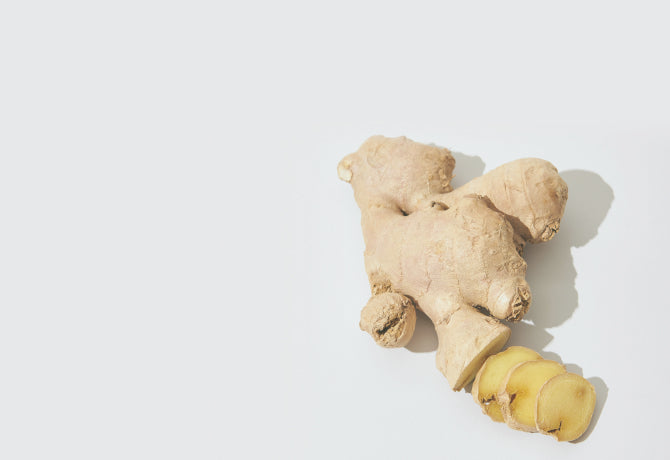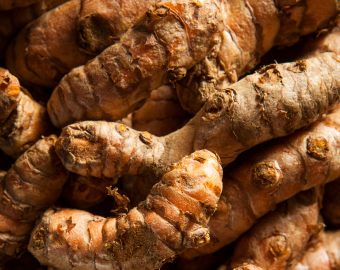Themen dieses Blogartikels:
Table of contents
- Why is a strong immune system important?
- Invisible saboteurs: causes of a weak immune system
- Stress as a silent opponent
- Too intensive training weakens the immune system
- Viruses as a stress test for your protective shield
- Office life in autumn: viruses spread quickly
- Lack of sleep makes immune cells tired
- Nutrient deficiency means lack of building material
- Intolerances and silent inflammations
- Autoimmune reactions: When the immune system overshoots the target
- Other underestimated disruptors as causes of a weak immune system
- Recognize and strengthen a weakened immune system
- Tips to strengthen your weak immune system
- Don'ts: What you should avoid in autumn
- Conclusion: With a balanced diet and a relaxed lifestyle, you can start the autumn strengthened
- Sources & Bibliography
Why is a strong immune system important?
The immune system is your body's natural shield, defending you against harmful substances such as viruses, bacteria, or fungi. It not only fights unwanted invaders but also remembers specific pathogens for future protection. It consists of a finely tuned network of cells such as T cells and B cells, organs such as the spleen, and barriers such as the skin and intestinal mucosa.
However, your protective shield is only as strong as its components. If your immune system is impaired, not only does your well-being suffer, but you are also more susceptible to illness. A weakened immune system makes it particularly easy for invaders like flu or coronaviruses to wreak havoc in your body.
Want to know exactly how your body's personal anti-attack army works? In our blog, you'll find detailed information about the tasks and functions of the immune system and its most important defense mechanisms.
Invisible saboteurs: causes of a weak immune system
A weakened immune system can have various causes. Many of these creep into everyday life unnoticed or are often not even associated with the immune system. We'll now introduce you to the most common saboteurs of your immune system .
Stress as a silent opponent
Acute moments of stress can have a positive effect on the immune system, as stress impulses mobilize defense cells and make you more responsive in the short term . Chronic stress, on the other hand, leads to permanently elevated cortisol levels . This stress hormone inhibits, among other things, the activity of T cells. This special type of white blood cell is responsible for specifically targeting pathogens.
A meta-analysis has shown that chronic stress —whether caused by work-related pressure or family overload—can lead to a weakened immune system.¹ Especially if you have a family and have to constantly juggle work, child-rearing, and daily responsibilities, this can unnoticed put your body into survival mode , in which your immune system runs on low .


Too intensive training weakens the immune system
Sport is considered an immune booster: Even moderate exercise such as walking, cycling, or light jogging can promote blood circulation, activate immune cells, and reduce stress hormones.² People who exercise regularly but not excessively are less likely to develop infections than people who do almost no exercise at all.
The situation is different with overexertion : After very intense or long training sessions, the immune system reacts with a kind of "fatigue phase," which pathogens can use as a gateway . This is also the reason why some athletes complain of respiratory infections after marathons or extreme exertion. Even if you're not running a marathon, you should be careful. If you're freezing in sweaty clothes after a fall run, for example, it weakens your immune system more than the run you just completed strengthens it.³
Viruses as a stress test for your protective shield
In the fall, poorly ventilated classrooms, packed buses, and constant contact with different people in enclosed spaces are commonplace. Many schoolchildren bring home not only homework but also viruses. Studies show that the first few weeks of school are associated with an increased number of respiratory infections.⁴


Pathogens are unavoidable, but with a strong immune system, they act more like a stress test than a threat. For parents, this means that even towards the end of the summer holidays , it's worth reducing the risk of infections and strengthening children's immune systems through good sleep routines, a vitamin-rich diet , and regular handwashing.
Advertisement
- Daily routine for the gut and immune system
- Flora Balance with 27 probiotic bacterial strains
- Flora Stabil with 30g fiber & 14 plant substances, for the intestinal flora and the microbiome
- Phytobiose Total with 11 other valuable plant substances for the immune system
- Developed with doctors & experts
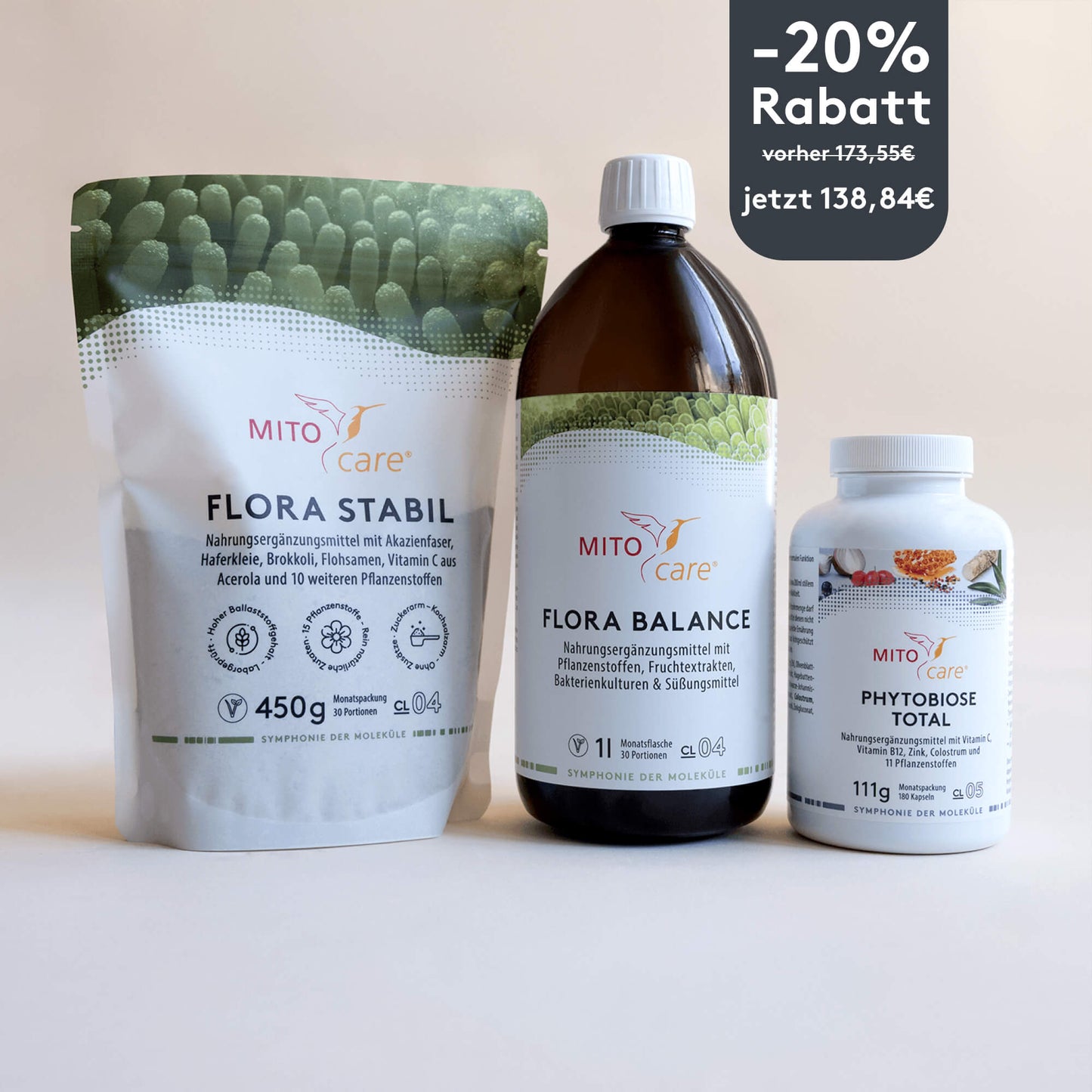

Office life in autumn: viruses spread quickly
But the risk of infection isn't just increasing in classrooms: In many offices, too, everyday life is returning with the end of the holiday season – including crowded open-plan offices, meetings in closed rooms, and the exchange of all kinds of holiday souvenirs. Those returning from vacation often bring new germs with them – whether from the plane, hotel buffet, or crowded tourist resorts. Therefore, during this transitional period, the first infections after the summer are also on the rise among adults.


Poor ventilation, air conditioning, and a weakened immune system due to travel stress or lack of sleep also contribute to this. Therefore, it's worth focusing on preventative measures in your everyday working life: drinking plenty of fluids, taking short breaks for fresh air, observing hygiene rules—and, above all, giving your body time to return to its natural rhythm.
Lack of sleep makes immune cells tired
When you sleep , your immune system is firing on all cylinders : At night, messenger substances like cytokines are produced, which regulate inflammatory processes and control immune cells . Too little sleep means too little protection for your body. Participants in a study who slept only five hours a week for a week had a significantly increased risk of catching a cold.⁵
Families with children, in particular, need to pay attention to their sleep hygiene . Adequate sleep not only boosts the immune system but also supports growth – and parents' resilience to stress.
Advertisement
- Immune Boost Package as support in challenging phases - especially in autumn
- Phytobiose Total with 11 powerful plant substances such as nasturtium, cranberry, propolis & more
- Vitamin C complex - high dose as a special protective factor
- Adek vitamin oil with the 4 fat-soluble vitamins A, D, E & K
- Phytobiose Liquid with honey & Ling Zhi and many other premium active ingredients
- Developed with doctors & experts
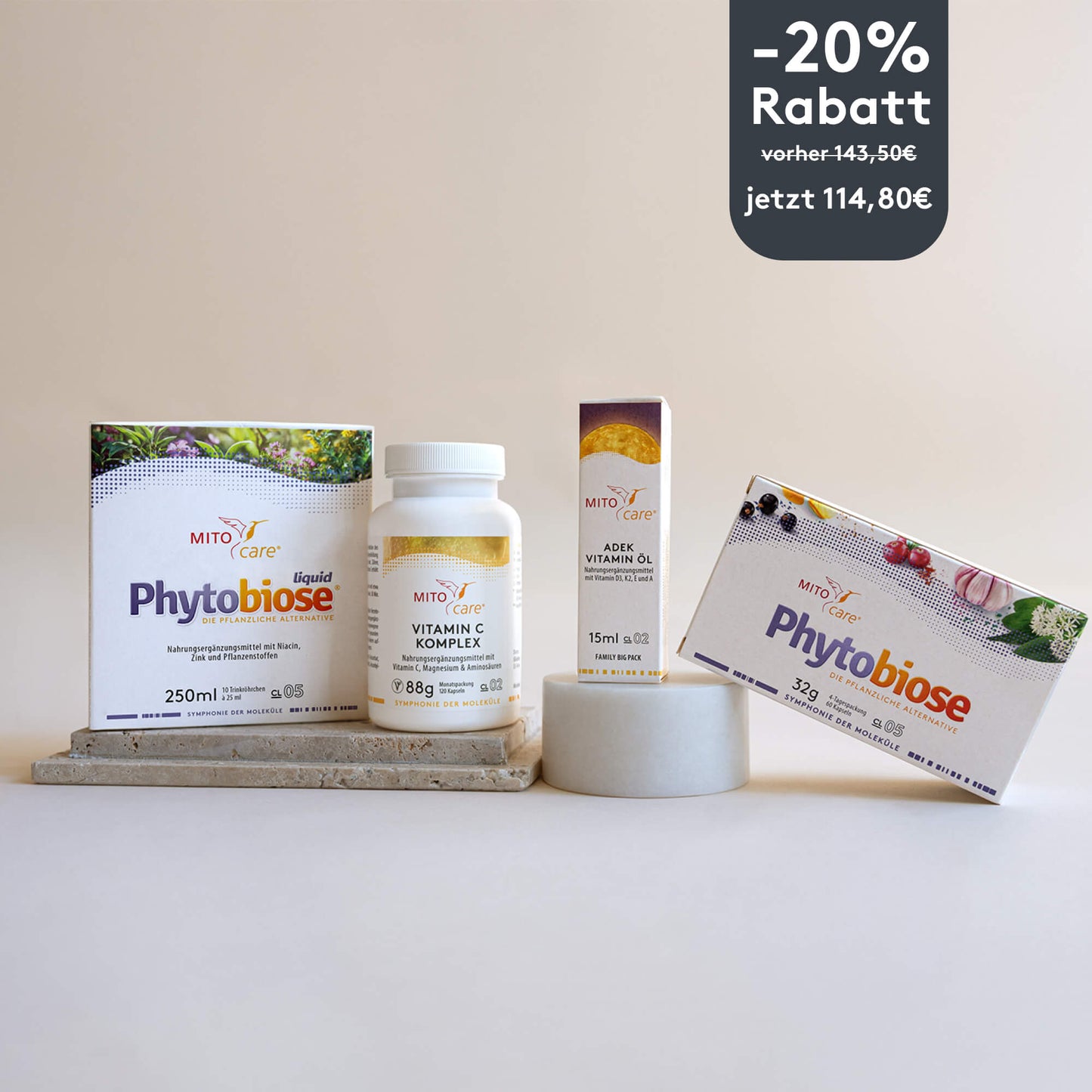

Nutrient deficiency means lack of building material
Without micronutrients Your body cannot build an optimal defense against invaders. Vitamin C , zinc , selenium , and vitamin D are particularly important for supporting your immune system. You get many important nutrients through your diet.
With vitamin D, however, this isn't so easy, as vitamin D is primarily produced through sunlight . Starting in autumn, sunlight in Central Europe is often no longer sufficient to meet daily needs. In Germany, about half of all children and adolescents and more than half of adults lack sufficient vitamin D in their blood.⁶
Your immune system also feels the effects: Low vitamin D levels, for example, can lead to an increased susceptibility to respiratory infections.⁷ In autumn, it is therefore worthwhile to check your vitamin D levels with your doctor or alternative practitioner and take measures to ensure an adequate vitamin D intake.
Intolerances and silent inflammations
Undetected food intolerances, for example, those related to gluten or histamine , can put a strain on the gut.⁸ The problem: The gut contains up to 70% of the immune cells , making it the largest immune organ. Persistent irritation of the intestinal mucosa can therefore lead to silent inflammation and weaken the immune system. In our blog, you'll find useful information and expert tips on histamine intolerance .
Autoimmune reactions: When the immune system overshoots the target
The immune system normally protects us from viruses, bacteria, and other invaders. But sometimes this protective function can become unbalanced. In such cases, the body's defenses turn against its own tissue—this is known as a misguided immune response.
The causes are complex: genetic predisposition, environmental factors and certain stimuli such as infections or changes in the microbiome can play a role.
Anyone who suffers from unclear symptoms such as chronic fatigue, joint problems or skin reactions over a long period of time should consult a doctor to determine whether an immunological cause is possible.
The goal is then not necessarily to “strengthen” the immune system, but rather to regulate its reaction and bring it back into balance.
Other underestimated disruptors as causes of a weak immune system
- Heating air dries out mucous membranes, making it easier for viruses to penetrate
- Alcohol and sugar weaken immune cells and promote inflammation
- Smoking and air pollution damage the respiratory system
- Medications such as antibiotics or cortisone affect the body's immune system
- Crowds increase the risk of disease infection
- Pregnancy reduces the immune response to protect the baby
- Obesity promotes silent inflammation and strains the immune system
- Too much caffeine disrupts sleep and increases stress hormones
- With increasing age, the production of new antibodies decreases
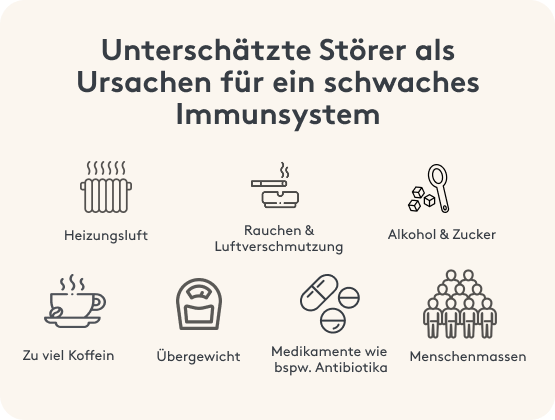
Recognize and strengthen a weakened immune system
You only notice your immune system in everyday life when it weakens. Typical symptoms are often nonspecific at first. They include persistent fatigue, listlessness, loss of appetite, lack of energy, and difficulty concentrating. Another warning sign is an increased susceptibility to infections. If colds occur unusually frequently or an illness takes longer to heal, it's high time to support your immune system.
Advertisement
- Immune Balance package with scientifically based building blocks for your immune system
- Adek vitamin oil with the 4 fat-soluble vitamins A, D, E & K
- Phytobiose Total with 11 powerful plant substances
- Premium Natural Omega 3 Oil with EPA & DHA for the cell membrane
- LIPO Curcumin Booster - as antioxidant protection with liposomal technology
- Study-based, developed with doctors & experts
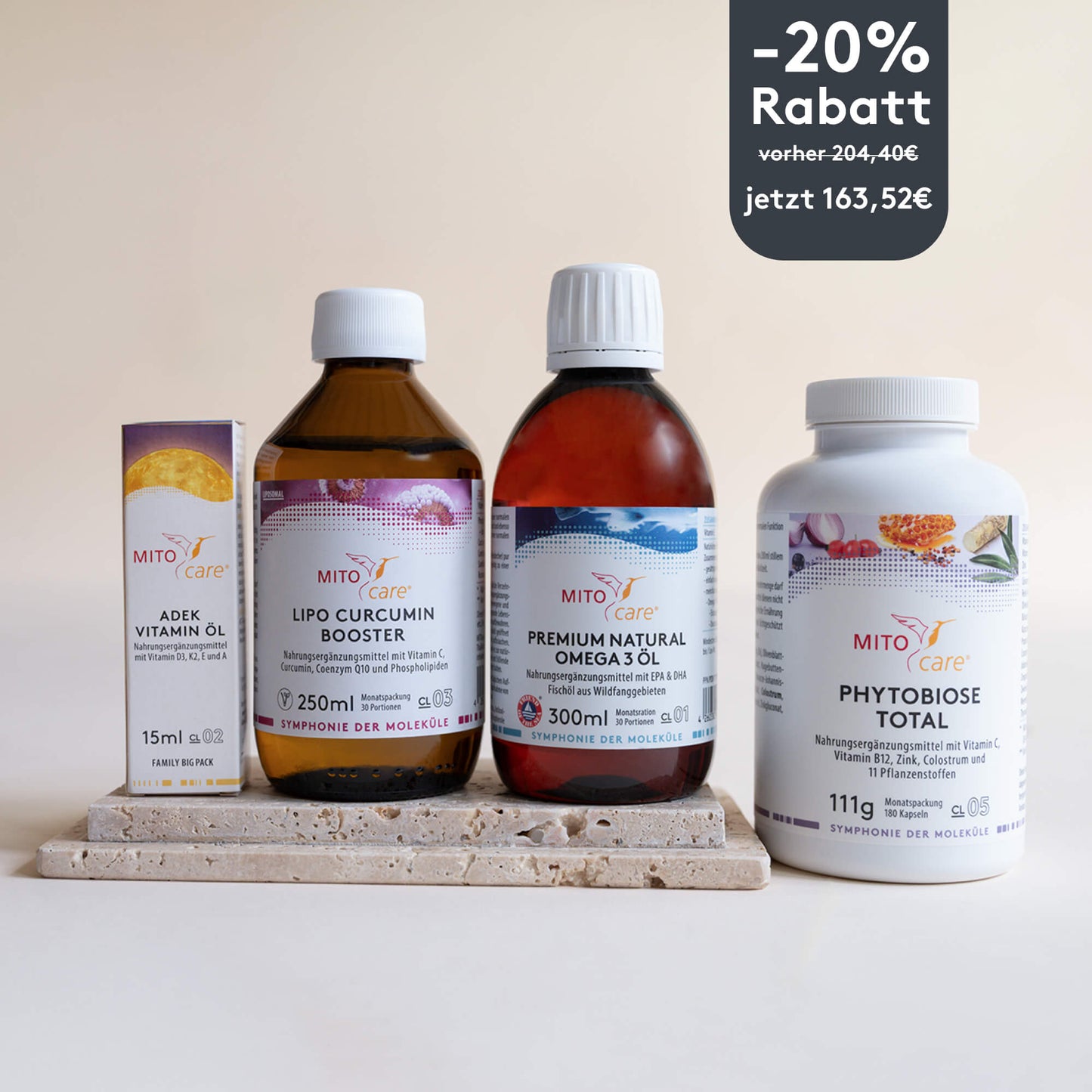

Tips to strengthen your weak immune system
Especially in autumn and winter, and when the first signs of a cold become noticeable, the following tips are like a little wellness treatment for your immune system.
- Be mindful of your diet: A varied, colorful diet rich in vitamins and minerals provides your immune system with the weapons it needs to fight off illness. Foods rich invitamin C, such as berries or citrus fruits, zinc from nuts and whole grains, and omega-3 fatty acids from fish or flaxseed, have anti-inflammatory effects and strengthen the immune system.⁹ If your vitamin D level test reveals a deficiency, you can consider supplementation if necessary. Do your children have a sweet tooth and love sugar? In our blog, you'll find tips for avoiding sugar in everyday life .
- Incorporate moderate exercise: Regular exercise promotes blood circulation, activates immune cells, and reduces stress.¹⁰ Moderate exercise in the fresh air is ideal. How about regular walks with the family through the autumn-colored forest, a game of ball in the park, or a bike ride? If you want more, you'll find inspiration for exercise in the fall here.
- Reduce stress: Chronic stress is one of the biggest immune saboteurs. Therefore, treat your body to relaxation as often as possible and create space for recovery – for example, through mindfulness training, short breathing exercises, yoga, or short breaks in your daily routine. This puts your body into recovery mode. Sometimes it even helps to reduce the number of daily appointments, if possible.
- Make sure you get good sleep: Regular bedtimes, a darkened, not too warm bedroom, and digital breaks in the evening ensure that you get the production of the sleep hormone melatonin going. If you're feeling the onset of a cold or if you've already caught one, you should treat yourself to an extra dose of rest and get one to two more hours of sleep per night. Small, regular rituals, like making a nice cup of tea or reading aloud to your kids in the evening, help establish a consistent sleep routine. You'll find helpful tips for deep, restful sleep in our blog.
- Use medicinal plants and home remedies: Traditional remedies such as echinacea¹¹, elderberry¹² or ginger¹³ can strengthen a weak immune system in a gentle and natural way and even shorten the duration of colds.
- Make yourself comfortable: After a strenuous day, a hot bath, a trip to the sauna, a hearty soup, a cuddle with a hot water bottle, or a cup of your favorite tea will do wonders for your well-being. The warmth stimulates circulation and relaxes you, making it easier for your body to defend itself.
- Laugh a little: Those who laugh more often have something to laugh about for longer, because laughter can help reduce stress hormones and boost the immune response.¹⁴ Small everyday moments of joy act like an immune booster. Consider it a sign to watch a comedy with your family more often this fall or play board games that leave no one dry eyed.
Don'ts: What you should avoid in autumn
- Overtraining in cold weather or without recovery
- Constant stress without compensation
- Sleep deficits because you think a lot or spend a long time on your phone
- Excessive sugar and alcohol consumption
Conclusion: With a balanced diet and a relaxed lifestyle, you can start the autumn strengthened
Your immune system is a complex network that can easily become unbalanced when stress, nutrient deficiencies, or sleep deprivation creep into your daily routine. Are you noticing symptoms of a weak immune system? Then you can sustainably strengthen your defenses against infections, bacteria and harmful substances with simple routines, helping you master the fall, the holiday season, and everything else that comes your way.
This article is based on carefully researched sources:
Sources & Bibliography
- Segerstrom, SC, & Miller, GE (2004). Psychological stress and the human immune system: a meta-analytic study of 30 years of inquiry. Psychological bulletin, 130(4), 601-630.
- Simpson, RJ, Kunz, H., Agha, N., & Graff, R. (2015). Exercise and the Regulation of Immune Functions. Progress in molecular biology and translational science, 135, 355–380.
- aerzteblatt.de/archiv/sport-und-immunsystem-08c338b0-e17a-4eb5-8741-cc9ad2320b39
- Temte, JL, Meiman, JG, & Gangnon, RE (2019). School sessions are correlated with seasonal outbreaks of medically attended respiratory infections: electronic health record time series analysis, Wisconsin 2004-2011. Epidemiology and infection, 147, e127.
- pharmazeutische-zeitung.de/2015-09/schlafmangel-erhoeht-risiko-fuer-schnupfen-deutlich/
- rki.de/SharedDocs/FAQs/DE/Vitamin_D/Vitamin_D_FAQ-Liste.html#entry_16871796
- Fletcher, J., Bishop, EL, Harrison, SR, Swift, A., Cooper, SC, Dimeloe, SK, Raza, K., & Hewison, M. (2022). Autoimmune diseases and interconnections with vitamin D. Endocrine connections, 11(3), e210554.
- Perrier, C., & Corthésy, B. (2011). Good permeability and food allergies. Clinical and experimental allergy: journal of the British Society for Allergy and Clinical Immunology, 41(1), 20–28.
- Calder PC (2017). Omega-3 fatty acids and inflammatory processes: from molecules to man. Biochemical Society transactions, 45(5), 1105–1115.
- Cerqueira, É., Marinho, DA, Neiva, HP, & Lourenço, O. (2020). Inflammatory Effects of High and Moderate Intensity Exercise-A Systematic Review. Frontiers in physiology, 10, 1550.
- Shah, SA, Sander, S., White, CM, Rinaldi, M., & Coleman, CI (2007). Evaluation of echinacea for the prevention and treatment of the common cold: a meta-analysis. The Lancet. Infectious diseases, 7(7), 473-480.
- Hawkins, J., Baker, C., Cherry, L., & Dunne, E. (2019). Black elderberry (Sambucus nigra) supplementation effectively treats upper respiratory symptoms: A meta-analysis of randomized, controlled clinical trials. Complementary therapies in medicine, 42, 361–365.
- Chang, JS, Wang, KC, Yeh, CF, Shieh, DE, & Chiang, LC (2013). Fresh ginger (Zingiber officinale) has anti-viral activity against human respiratory syncytial virus in human respiratory tract cell lines. Journal of ethnopharmacology, 145(1), 146-151.
- Bennett, MP, Zeller, JM, Rosenberg, L., & McCann, J. (2003). The effect of mirthful laughter on stress and natural killer cell activity. Alternative therapies in health and medicine, 9(2), 38–45.
